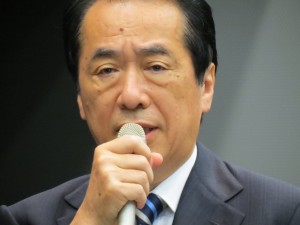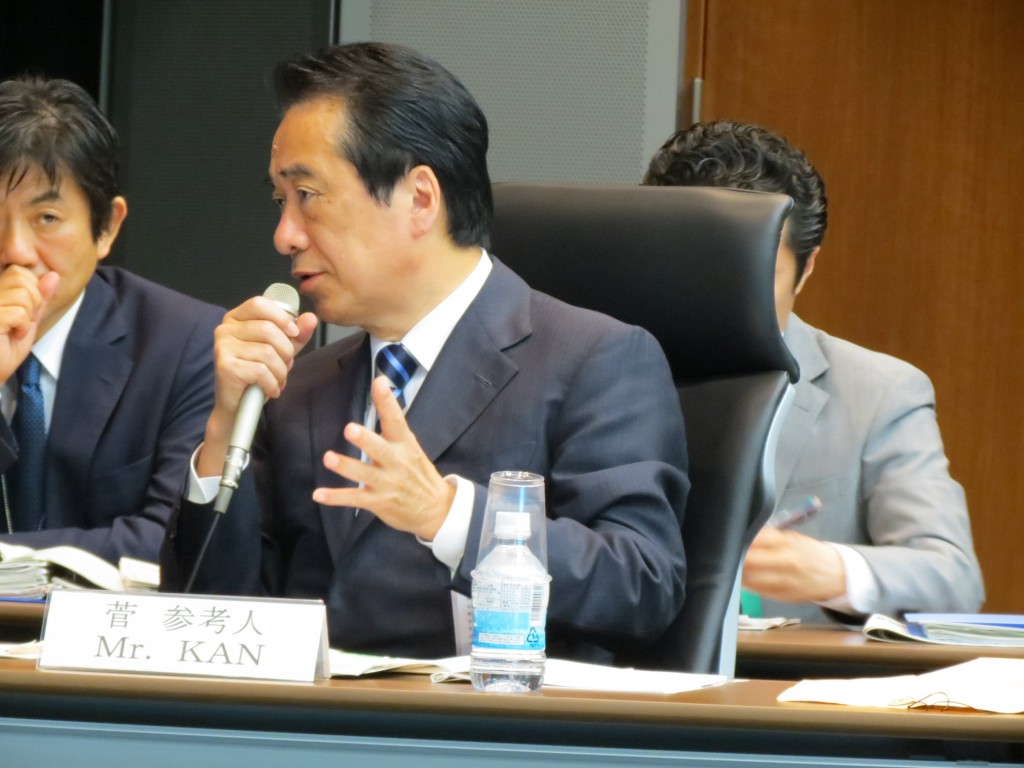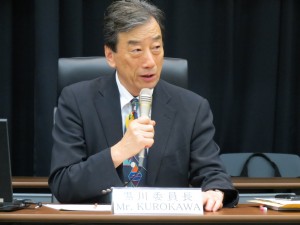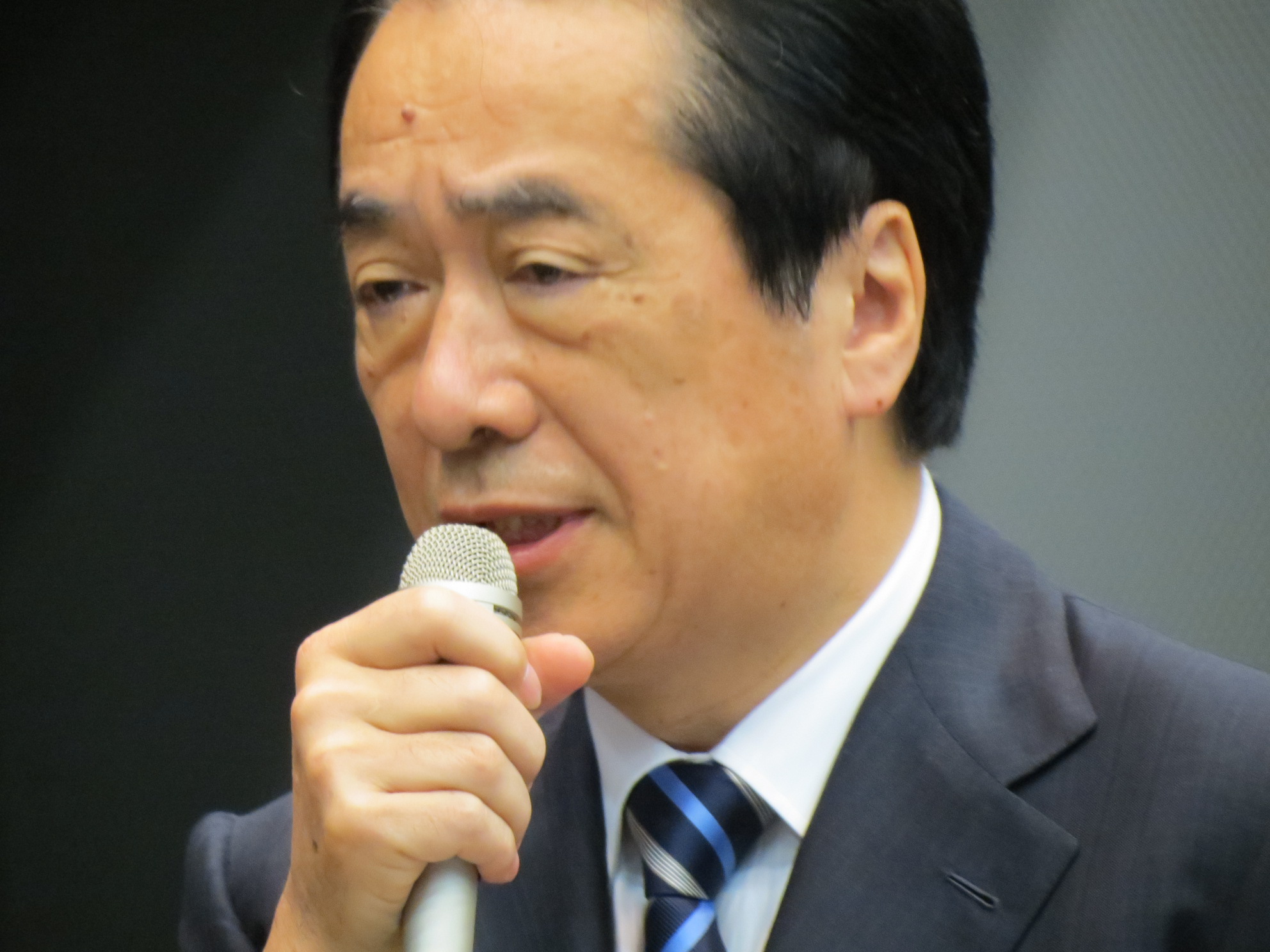Tokyo – May 28th, 2012
The former prime minister of Japan, Naoto Kan, speaking on the record about Japan’s worst nuclear accident in history, blamed the disaster on the nuclear village (原子力村) aka the nuclear mafia, inadequate laws, and the appalling incompetence of Tokyo Electric Power Company (TEPCO) and NISA (Japan’s Nuclear Industrial Safety Agency).

Kan spoke before the The Fukushima Nuclear Accident Independent Investigation Commission (NAIIC) chaired by Mr. Kiyoshi Kurokawa at their 16th meeting at the National Diet of Japan on May 28th. Mr. Kan served as Japan’s PM (Prime Minister) from June 8th, 2010 to September 11th, 2011, and was in power during the triple nuclear meltdown last March (2011).
Kan’s testimony today before the committee highlighted the inability and lack of preparation at TEPCO and the Japanese government for dealing with a nuclear disaster.
Kan said that his advisers at the government offices and TEPCO did not help him: “The basic explanation I had looked forward to receiving I was not able to receive.” At the time, Mr. Kan said there was no explanation from NISA whether he was given the authority to make the decisions and take the necessary actions on the site.
The Fukushima incident which is the worst nuclear crisis since Chernobyl in 1986, also revealed the ties between the nuclear industry and the government regulators known as “the nuclear village.” Because this collusion also involves the media that relies of energy industry advertising, Japanese organized crime, cover-ups, retirement positions for former nuclear regulators, and political corruption—some analysts refer to Japan’s nuclear-industrial complex not as the “the nuclear village” but as “the nuclear mafia” (原発マフィア). Kan said that this accident exposed “the roots of the illness” of the Japanese people and after this 3.11 accident, Japan should “think if it wants to continue with nuclear power.”

“I experienced this crisis and my views changed,” he said.
Kan said that the nuclear emergency preparedness law, passed in 1999, was completely inadequate for the triple meltdown. The law was created after a fatal accident at the Tokaimura (東海村) nuclear fuel processing plant, in which several people died and nuclear fission occurred, spreading radiation into the civilian populace. The power plant operators were later charged with criminal negligence resulting in death and convicted。They were all given suspended sentences and served no jail time. Japan’s nuclear industry has been plagued with accidents, many of them initially covered up.
Kan stated the laws did not take into account, a severe accident that would force hundreds of thousands of people to evacuate, as in Fukushima. It also did not make the chain of command clear, slowing down the response to the disaster.
“Everything addressed in the law was inadequate, and we had to waste time on things that we should not have had to do,” he said. He cited TEPCO and NISA incompetence several times, even naming individuals. For instance, the plant’s off-site crisis management center, which had little protection from radiation and no backup power sources, quickly had to be abandoned.
While Kan did not touch upon it, soon after the accident all NISA inspectors fled the area leaving no one to accurately monitor radiation levels. It was also revealed in recent reports that TEPCO had failed to reconnect a cable that would have sent real-time data on radiation levels to the government. The cable had been disconnected months before the accident, during routine repairs and TEPCO officials simply forgot to reconnect it.
He also admitted that he was not aware of his duties as PM in a nuclear crisis, as written in the Japanese laws.
He said he was never previously briefed on these specific points: “When it comes to the specific responsibilities and authorities given to the Prime Minister (PM), when a nuclear accident takes place,, I do not recall being briefed before or directly after the accident,” he said.
Long before he became a member of the National Diet, former PM Naoto Kan was involved in the civic movements which expressed suspicions about the safety of the nuclear power plants. At the time the political party he belonged to was advocating for the nuclear power generation only as a stop-gap measure, he admitted yesterday.
The alleged passiveness of the PM at the time of the nuclear accident has been much criticized. Mr. Kan explained that the PM has the obligation to serve as the “top of the counter-measure headquarters”, after the emergency situation has been established.
In that context, issues were discussed, whether as PM, what should his responsibilities be. The PM’s duties in case of a nuclear accident are specified in a number of laws but not clearly outlined. However Mr. Kan admitted that he was not fully aware of his duties at the time of the crisis: “When it comes to the specific responsibilities and authorities given to a PM, when a nuclear accident takes place, as a head of the counter-measure headquarters, after I became PM until the accident took place, I do not recall any situation where I was briefed on those points.” He admitted this while the members of the committee interrogated him yesterday. “I admit that as the head of the counter-measure headquarters, yes, I should have been briefed more deeply about my responsibilities and authority.”
Why The Delay In Declaring a State of Emergency?
The minister of METI, Mr. Kaieda asked for the PM’s approval for the issuance of the declaration of the emergency situation at a very late in the day of the accident. The reason for this late announcement was that there was a meeting held by top political leaders, which made it impossible to issue the declaration on emergency before the party leaders’ meeting at the time.
When the Minister of METI came to ask the PM’s approval, under article 15, the PM was the most knowledgeable person with regard to the nuclear accident. However the approval to issue the emergency state came very late after the METI minister asked Mr. Kan for the approval.
“I did not postpone the issuance of the declaration. The request was made to me at 5:42 for my approval of the declaration, on the other side, the meeting of the opposition party leaders was taking place, to which I was committed to participate, so it took one hour and 21 minutes to declare the emergency state” Mr. Kan said. “It was not an intentional delay of the approval.”
Evacuation decision and the 20km no-go zone or shelter in place
Regarding evacuation, the decision to set a 20km radius evacuation zone was taken on March 12, at 6:25pm. At that moment, there was already a hydrogen explosion that began at 3:36 pm moreover at unit 2 and 3. “Having heard the experts’ opinion, it was decided that it would be 20km.” Mr. Kan said. “There were various discussions held and regarding the fact of whether we were considering an evacuation zone of 30km,” Mr. Kan added. However, “to further expand the evacuation area, preparation needed to be made. If after the explosion of unit 1, units 2 and 3 possibly exploded, and radioactive material leaked out, depending upon the situation, it would have been more safe to shelter in place for a certain period of time, finally we heard our experts opinions and the decision was made for 20km, and after that it became 30km for asking people to seek shelter in their homes and stay indoors.”
Feeling the necessity to see the situation on the site by himself, after March 12th, Mr. Kan briefly visited the site of the accident, and received briefings from NISA, TEPCO, NSC and other technical experts, however, there was inadequate discussion of how bad the situation could become. “What TEPCO had told us is that we needed to provide the vehicles necessary to provide the power generation. And after that there was a discussion regarding venting activities. The basic explanation I had looked forward to receiving, I was not able to receive.”
As far as the venting activities were concerned, TEPCO said to the METI minister that they wanted to do the venting activities and METI accepted it, but it took TEPCO many hours before this happened in actuality. “So I asked why was it not happening? And the answer I got was ‘we do not know,’” Mr. Kan said. He asked Mr. Yoshida, the former head of the nuclear power station and its vice-president to make sure the venting activities that were vital would take place. “They said that they would make certain that people put their lives on the line to make this happen. And I had the impression that Mr. Yoshida would have in fact taken upon himself to make this happen. I was in the facility for about 40 minutes and then left. There were various judgments made there after I left. Especially regarding TEPCO’s decisions about leaving the site.”
Under the laws that exist, the PM can give the authority to make decisions to the local government. At the time, Mr. Kan said there was no explanation from NISA that they were not given the authority to make the decisions and take the necessary actions on site. “As far as the law says, it is something I looked at later on.” He admitted.
Normally, the government does not give an order to a private company. However the law said that authority to give necessary instructions on the part of the head of the emergency headquarters existed. “Just because it is stipulated in the law whether this attributed authority is exercised or not is something I was not thinking of from the early stages, but when this withdrawal issue was raised as a possibility, I felt that we needed to integrate the government in TEPCO’s decision making or otherwise a terrible situation would ensue. When the issue of TEPCO’s evacuation of its personnel from the site came out, the government and TEPCO then decided to form a joint task force to contain the crisis,” Mr. Kan explained.
From the US side, there was an indication that there would be support at a very early stage. When Mr. Kan communicated with the president, via a hot-line, he received the message from the President Obama that the US would support Japan in every way.
On the day of the accident, the tsunami and earthquake happened, and the nuclear accident happened, USS Ronald Reagan came in the evening off the coast of Fukushima, and Sendai airport’s response was going to be undertaken and various types of materials were to be provided. “I felt very grateful for this assistance by the US. And generally speaking I wanted to receive any support from the US side. The Ministry of Defense has a very deep relationship with the US military, so there were consultation held, military to military between our two countries from a very early stage,” Mr Kan said.
However, with regard to the idea proposed by the US to station someone of a certain position from the US at the PM’s official residence, Mr. Edano said at his own hearing, that the offer was not really declined, but rather “something that could not be accommodated upon Mr. Edano’s judgment.” Naoto Kan, at his hearing yesterday said that he was not aware of this; the chief cabinet secretary did not report this to him. If indeed the chief cabinet secretary declined the offer from the US without consulting Mr. Kan, Edano clearly exceeded the limits of his authority.
*The Fukushima Nuclear Accident Independent Investigation Commission (NAIIC)
Recently a number of committees have been created to exorcise these ghosts, determine what really went wrong at the Tokyo Electric Power Company (TEPCO) run Fukushima Nuclear Plant and figure out whether Japan should continue to rely on nuclear energy.
The NAIIC did not start work until nine month after the accident. The commission’s mission is to “first carry out an accident investigation on behalf of the people; secondly to make proposals for the future; and thirdly to carry out Japan’s responsibility as a member of the world community,” the chairman of the Commission, Mr. Kiyoshi Kurokawa said in an interview.

Whatever response is taken to this nuclear accident, it will affect Japan and the world for several decades to come. The investigation has to clarify where responsibility lies and has to prevent such an accident from occurring a second time. For this purpose, the Commission “intends to make use of its legally constituted investigative authority as the National Diet’s designated accident investigation commission to sincerely and objectively pursue the facts and make proposals for the future.”
It would not be too much to say that the nuclear accident has destroyed trust in Japan around the world. Restoring that trust will require an independent, objective investigation conducted by an organization without ties to any of the parties involved.
A commission such as this is the first kind in the history of Japan’s constitutional government. Independent, third party accident investigation commissions have been established in a number of foreign countries in response to serious accidents, but never in Japan. In the USA, the Kemeny Commission that investigated the nuclear accident at Three Mile Island is well known.
The NAIIC is considering to review President Masataka Shimizu, from TEPCO, chairman Mr. Kurokawa appears to be saying that he is uncertain if the committee can compel testimony. He said he would not comment on the investigative authority of the NAIIC and on the possible refusal by Mr. Shimizu to participate to a hearing: “Whether or not ‘testifying’ is a process that we have in Japan, I am not sure. I invite you to review the laws that we have been given under our mandate. Every possibility is under consideration”, including appointing Mr. Shimizu to our hearing, Mr. Kurokawa said.
The next witness appointed by the committee for its 17th meeting has been the governor of Fukushima, Mr. Yuhei Sato, in Fukushima, on May, the 29th. Expect our report sooner or later.
The NAIIC will be issuing its final report in June.

Various English-language reports, most sourced from AFP or AP, report that Mr. Edano refused the offers of help made by Ambassador Roos on the grounds of Japanese sovereignty. The quotes in the press are not identical, but the differences could be explained away by choices made in translating Japanese to English. AP’s quotes are:
“I declined the request,” Edano said. “The prime minister’s office is a place to make decisions as a sovereign nation and it was not desirable to have foreign officials stationed there.”
while AFP reported them as:
““But from the viewpoint of Japan’s sovereignty, I declined to accept the offer,” said Edano, who is currently the industry minister. ”
The gist being reported remains the same: on the specious argument of protecting Japanese sovereignty. Mr. Edano declined American assistance, which had available resources beyond which he, as a nontechnical politician, could conceive (e.g., the US no longer explodes nuclear weapons, but instead uses computer simulations to determine how weapons components are degrading in the presence of radiation from the warheads; there are folks who understand the physics involved extremely well and have models already programmed). The lack of thought behind such a decision is ridiculous: being provided useful information by domain experts doesn’t take away one’s responsibility for the decisions that are made. It’s just as true when a parent provides advice to their 30-something child as is does when consultants brief the president of a company.
Mr. Edano also seems to have been oblivious to the fact that it wasn’t just his constituents who would be affected by plumes of radioactive particles, which do not recognize international borders, carry passports and request visas before making landfall. Indeed, US naval forces had to change their locations to avoid continued exposure and decontaminate aircraft which had been exposed during rescue operations.
His decision wasn’t an honest mistake. It was a deliberate choice, justified by flawed reasoning, and appears to outsiders to have been motivated by a desire to save face rather than address a significant, time-critical, physics-driven emergency with the best resources available. And make no mistake, they were on a clock, driven by cold equations and impervious to any sweet talking… Yet quite a bit of the process was driven with an eye to protecting Japanese sovereignty, such as the lack of any native radiation-hardened robotic systems capable of working in the damaged plant environment and the resistance to accepting the use of equipment provided by others. If they had been able to be effective in quickly getting the reactors cooled properly, the entire event would have just been a close call. Instead, they lost control and didn’t regain it until radiation leaks, explosions, and meltdowns occurred and Fukushima became really well-known worldwide.
Gerry Anderson’s Thunderbirds has been popular in Japan, but I suspect that if International Rescue ever did show up to save the day, they’d be turned away by some political creature on the grounds that they had to protect the sovereignty of the locals.
This is a great comment. Thank you very much.
This is one of the best “overview” articles I have read concerning Mr. Kan’s testimony before the NAIIC. I would have liked to have seen Kan’s statements “balanced” by prior conflicting statements made to the NAIIC by officials of the government and Tepco. Regardless, it seems you have presented a very objective report on Mr. Kan’s statements, leaving out the sort of “spin-doctoring” common the the Press. For this you should be commended..
Thank you for very much.
[…] known as the “nuclear village” was held responsible for complacency in Fukushima by none other than its Ex-PM, Mr Naoto Kan s well as an independent investigative committee. But nobody takes conflicts of […]
[…] Jake Adelstein: Ex-Prime Minister blames meltdown on “Nuclear Village”, inadequate laws and TEPCO/NISA incompete…, Japan Subculture Research Center, […]
[…] The Rokkasho reprocessing plant is designed to extract metallic from spent reactor gasoline. If it begins operating this time, it should separate extra plutonium, even though Japan already has about forty five tons of it stockpiled in Europe and domestically–sufficient for greater than 5,000 nuclear bombs. The US and the IAEA has regularly raised considerations that the lax safety at Japan’s nuclear energy crops—which don’t even run background checks on the employees–and tolerate yakuza (gangsters) engaged on website–could make them a target for terrorists. Nevertheless, once we look at the historical past of mismanagement and incompetence of the utility corporations operating the crops, it seems the greatest credible nuclear threat of them all is yet another accident. […]